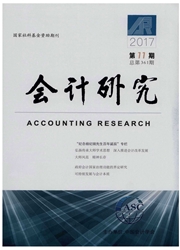

 中文摘要:
中文摘要:
自我国2007年开始实施的新会计准则把“投资收益”和“公允价值变动损益”划入“营业利润”范畴内,近年来多次出现上市公司利用大量“投资收益”增加短期利润弥补亏损的现象。本文系统地分析了2007年至2011年深沪两市A股上市公司的投资收益和公允价值变动损益,发现投资收益和公允价值变动损益的盈利持续性显著低于营业利润其它组成部分,虽然股价完全反映了公允价值变动损益暂时性盈利的特征,但高估了投资收益对于未来盈利的持续能力,构造卖空投资收益占净利润比重高、买人投资收益占净利润比重低的公司的对冲投资组合能够在未来一年得到超额股票回报率;尤其对于主营业务亏损、盈余管理动机较强的公司,投资组合超额回报率更为显著。本文结果帮助投资人理性认识属于“营业利润”范畴内的“投资收益”和核心营业利润的差异,并且对报表使用者正确运用2007年后广泛实施的新会计准则提供重要警示。
 英文摘要:
英文摘要:
The new Chinese accounting standards implemented from 2007 reclassify "investment income" and "unrealized gains or losses from trading securities" into the section of operating income. Recent anec- dotal evidence suggests that many public companies have created big amount of "investment income" to increase short-term earnings or mitigate losses. Using a sample of all Chinese A-share companies from 2007 to 2011, this paper finds that investment income and unrealized gains and losses from trading securities have significantly lower persistence than the rest of operating income. Additionally, the stock market does not fully reflect the lower persistence of investment income, but fully incorporate the transitory nature of unrealized gains and losses from trading securities. Trading strategies taking a long position of stocks with low proportion of investment income to net income and a short position of stocks with high investment income relative to net income Will earn significant positive returns in the next one year. The returns are more significant and positive for strategies taken in firms with operating losses before investment income and unrealized gains and losses. This paper sheds light on the proper use of the new Chinese accounting standards and provides impor- tant implications to investors for correctly differentiating the investment income from the rest of operating income.
 同期刊论文项目
同期刊论文项目
 同项目期刊论文
同项目期刊论文
 期刊信息
期刊信息
